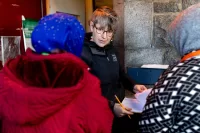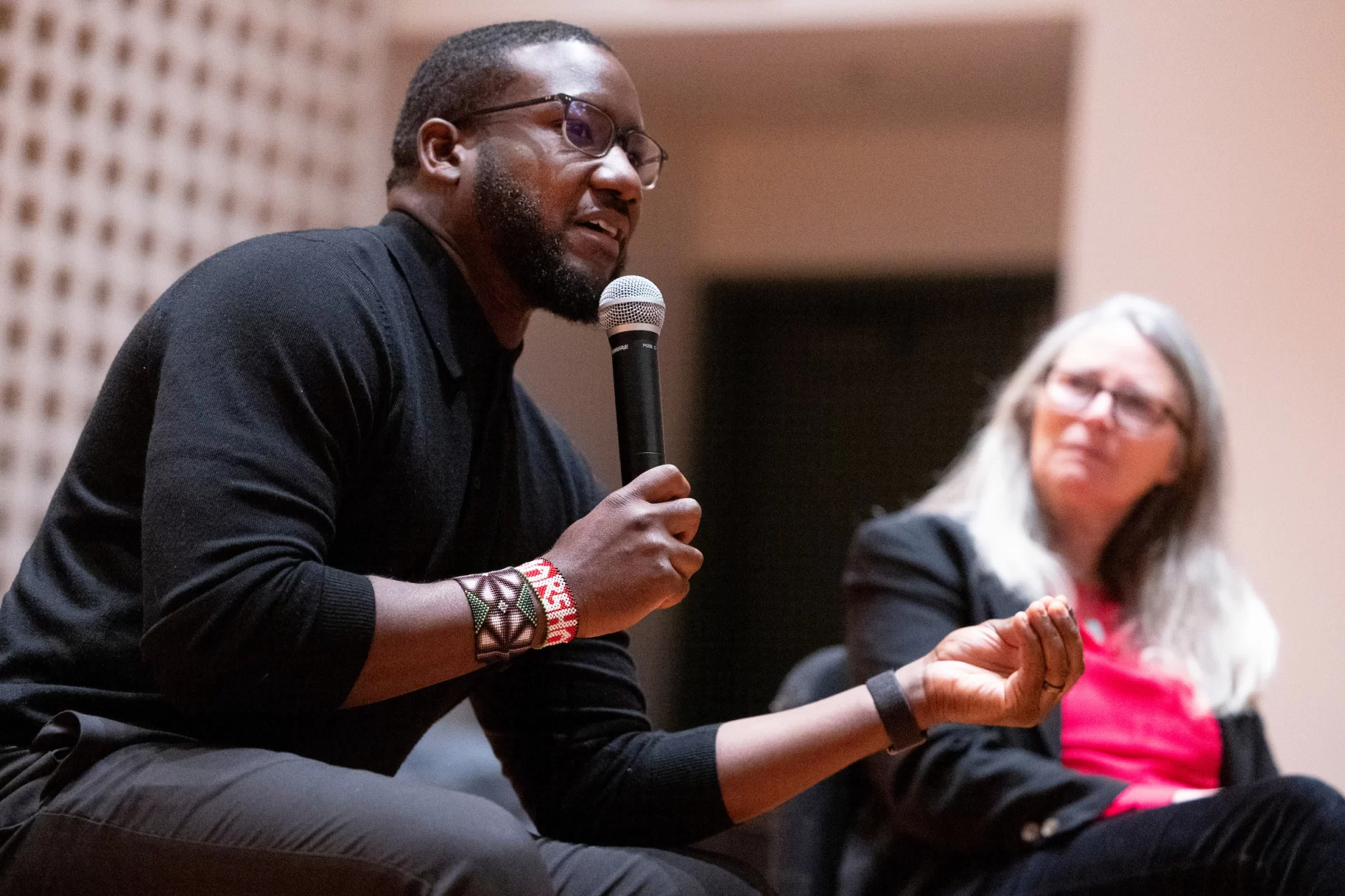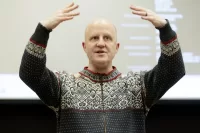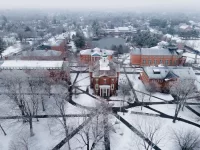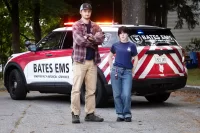
On a recent Thursday, Jose Carmona ’25, a politics major from Chicago, walked a few blocks from campus to see Carmen Thibodeau at her home. He’s been doing this throughout his four years at Bates, visiting the woman he considers his Lewiston grandmother.
Thibodeau gives him everything from life advice to lemonade on these visits. He does his homework on her couch, and then they might catch up on whatever show they’re watching together (Brilliant Minds is a current favorite) while her 14-year-old dog, Sally, circles around them both. It’s cozy, like family.
How to Watch Commencement
Livestreamed on the Bates website and the Bates Facebook page, the Bates Commencement ceremony begins at 10 a.m. on Sunday, May 25, with live coverage beginning at approximately 9:30 a.m.
And at this point, the Thibodeaus and the Carmonas practically are family, because Jose is not the first of this Chicago-to-Bates family to visit the tidy green house near campus. This relationship spans 11 years and three more Carmona siblings: Jose’s brother and two sisters.
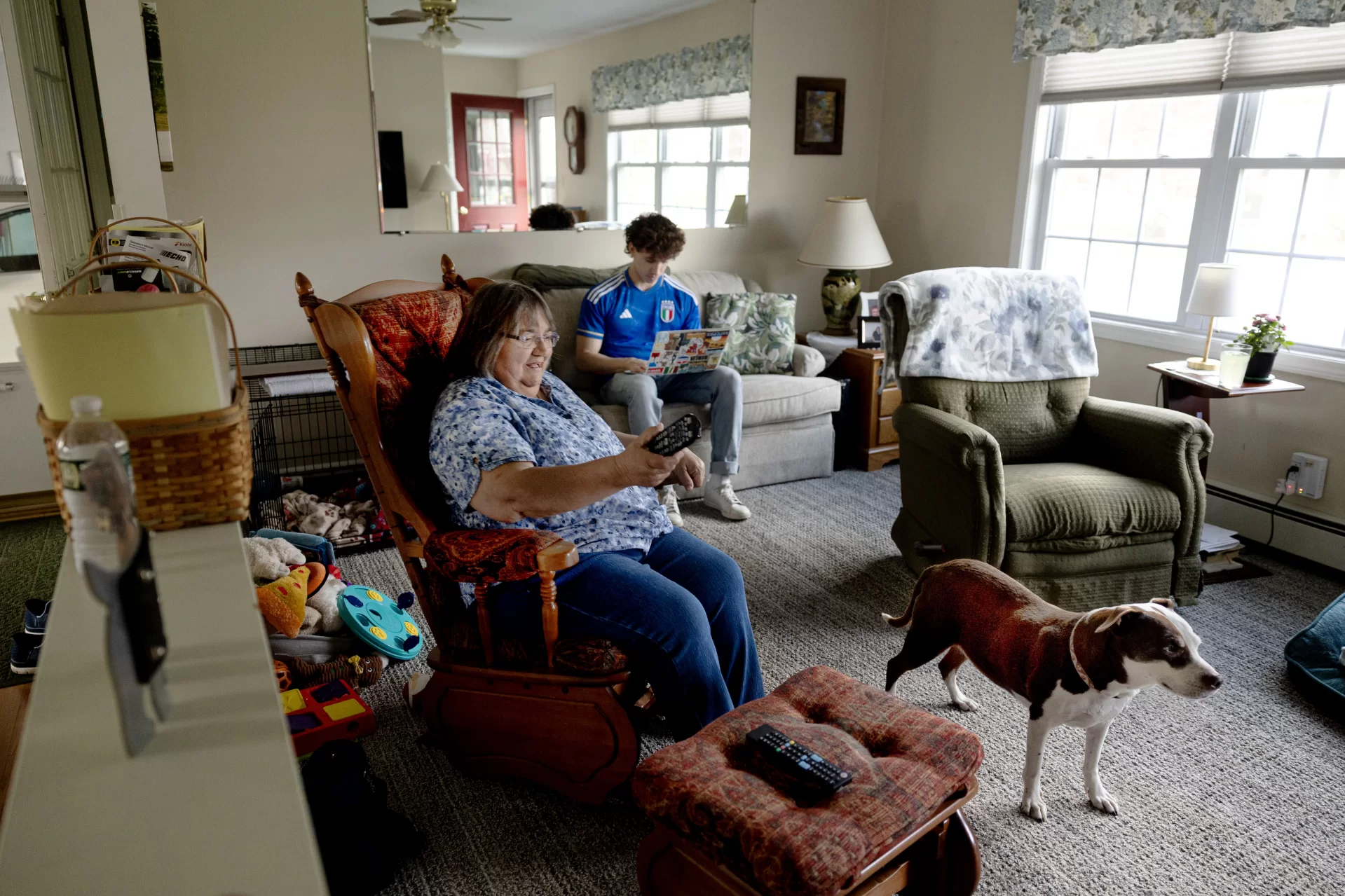
On Sunday, May 25, Jose will be the last of the Carmona siblings to graduate from Bates, following in the footsteps of Christopher, age 29, and Alanis, age 28, both members of the Class of 2018, and Carolina, who graduated in 2022. Each of them, during their journey through Bates, formed deep bonds with Carmen Thibodeau, her daughter Kristen, and, before his death in 2022, Carmen’s husband, Richard.
The highlights of their times together fill a few pages of the notebook sitting on the kitchen table in front of Carmen. She’s jotted them down in preparation for an interview. They’ve hit all manner of Maine hot spots, from lighthouses to apple orchards to Height of Land, near Rumford, where she and her husband grew up, and the Fryeburg Fair (the draft horses were a big hit). Her daughter, Kristen, took Jose to see Stephen King’s place in Bangor last fall. Mother and daughter bought Jose his first legal drink on his birthday at Mac’s Grill in Auburn.
There have been Easters and Thanksgivings together. There’s a Mexican restaurant in South Portland that Kristen found which made the siblings feel like they were experiencing something akin to their mother Rosa’s legendary cooking. A shelving unit in the garage was devoted to summer storage for the Carmonas. Through these years there have been many airport runs. Farewells, but always greetings again in the fall because there has been at least one Carmona attending Bates since 2014 and a spot on the couch for them. Roommate problems? Starbucks cravings? Call Carmen.
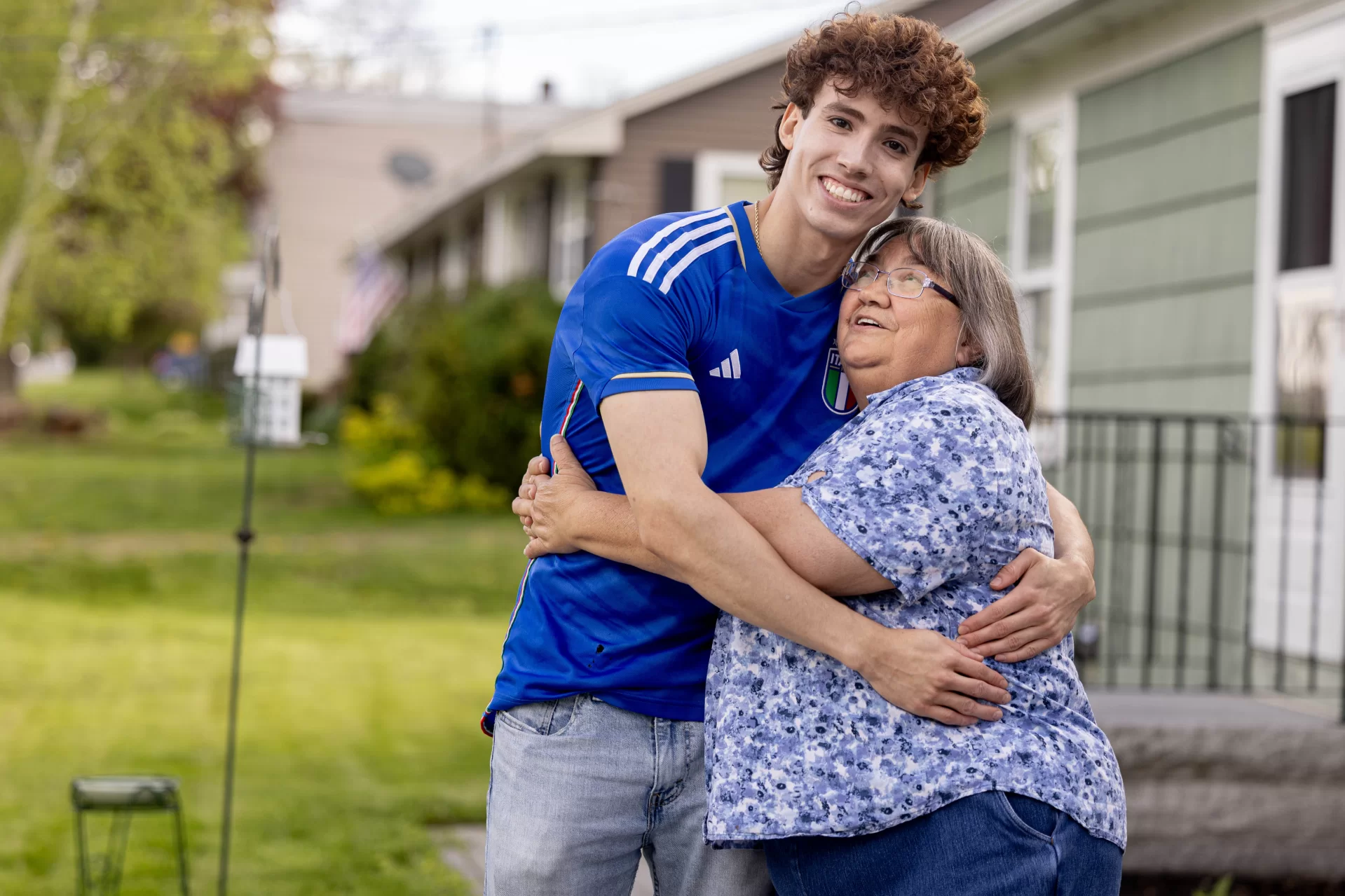
She’s retired, having started her career at the Oxford Paper Mill in Rumford out of high school, taking a break when she had her daughter and son, then working at Liberty Mutual insurance in Lewiston for 30 years. She keeps very busy, helping neighbors with a multitude of errands and appointments. She’s got a 9-year-old grandson. But the last of the Carmonas graduating from Bates is a landmark.
“And when they leave, it’s not going to be good,” Thibodeau says.
Then she smiles and her eyes light up. “One of the kids one time said, ‘Well maybe we could send one of the dogs.’” (Back home in Chicago’s Logan Square neighborhood, the family has four dogs.) At least one Carmona will still be relatively close by; Alanis is just finishing her third year of a Ph.D. program in cancer metabolism at the Harvard School of Public Health and she pops up to see Thibodeau when she can.
Just how did this relationship come to be? As far as Thibodeau is concerned, it’s not particularly complicated. “They are so special and so nice, and the parents are so appreciative, how can you not? You know what I’m saying?”
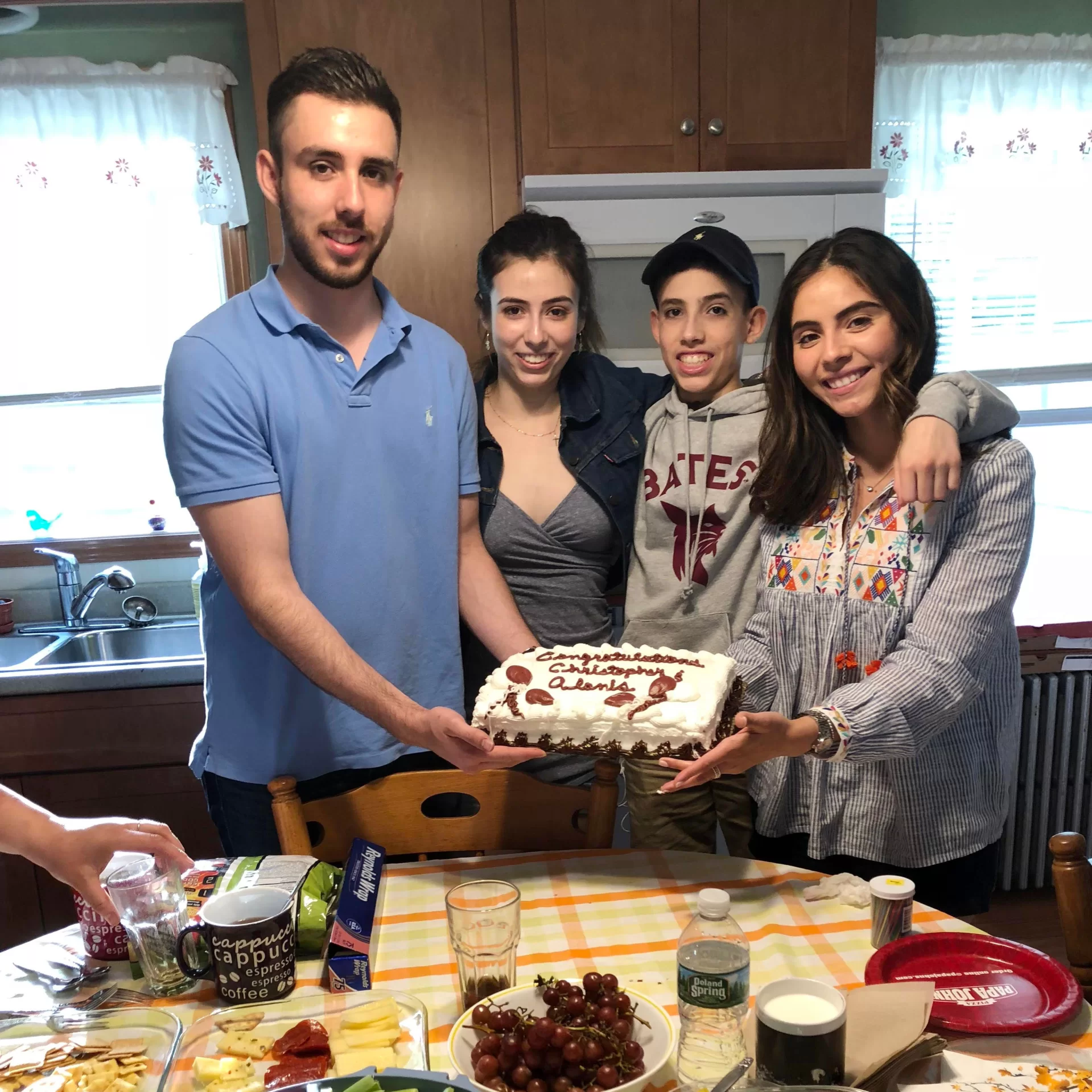
But the story actually goes back to 2011, when Richard was a regular visitor to the Bates campus to walk their Siberian husky, Wyatt. Early one spring day, he struck up a conversation with a student named Uriel Gonzalez, a senior from Texas. Gonzalez had been noticing Richard and the beauty of the dog for years (“it’s just not a dog you see anywhere”) and exchanging casual hellos. But that day they talked, and Richard mentioned he was looking forward to seeing the Senior Thesis Exhibition, particularly so he would see artwork by a senior he’d read about who wove indigenous influenced themes into his work. “And I said, ‘Well, I’m the artist,’” Gonzalez remembers.
“My husband runs home with the dog,” Carmen Thibodeau says. “My cousin Linda was visiting from California and we were sitting here in our PJs and having tea. And he comes in, ‘Hurry up, hurry up, we got to go to the museum right now because we’re going to see this artist’s work and he’s coming over for a visit after.’”
Richard, a licensed practical nurse, worked in eldercare in Lewiston and, prior to that, at one of the state’s psychiatric hospitals, in Augusta. He was an avid reader, Carmen says, and “he could talk to anyone about anything.”
Gonzalez and the Thibodeaus became fast friends. After graduating, Gonzalez took a job in Bates Admission and stayed in Lewiston for nearly two years, stopping by the Thibodeaus’ regularly. “They had a garden going and they’d send me home with jalapeños and tomatoes,” he recalls. And sometimes he stayed for dinner. “Commons is obviously great food but sometimes you need a little bit of a changeup.” They became close. “They’re just very genuine, sweet people.” Gonzalez was in the process of becoming a U.S. citizen at that time — Richard had urged him to do so — and the Thibodeaus were there for the citizenship ceremony when it became official.
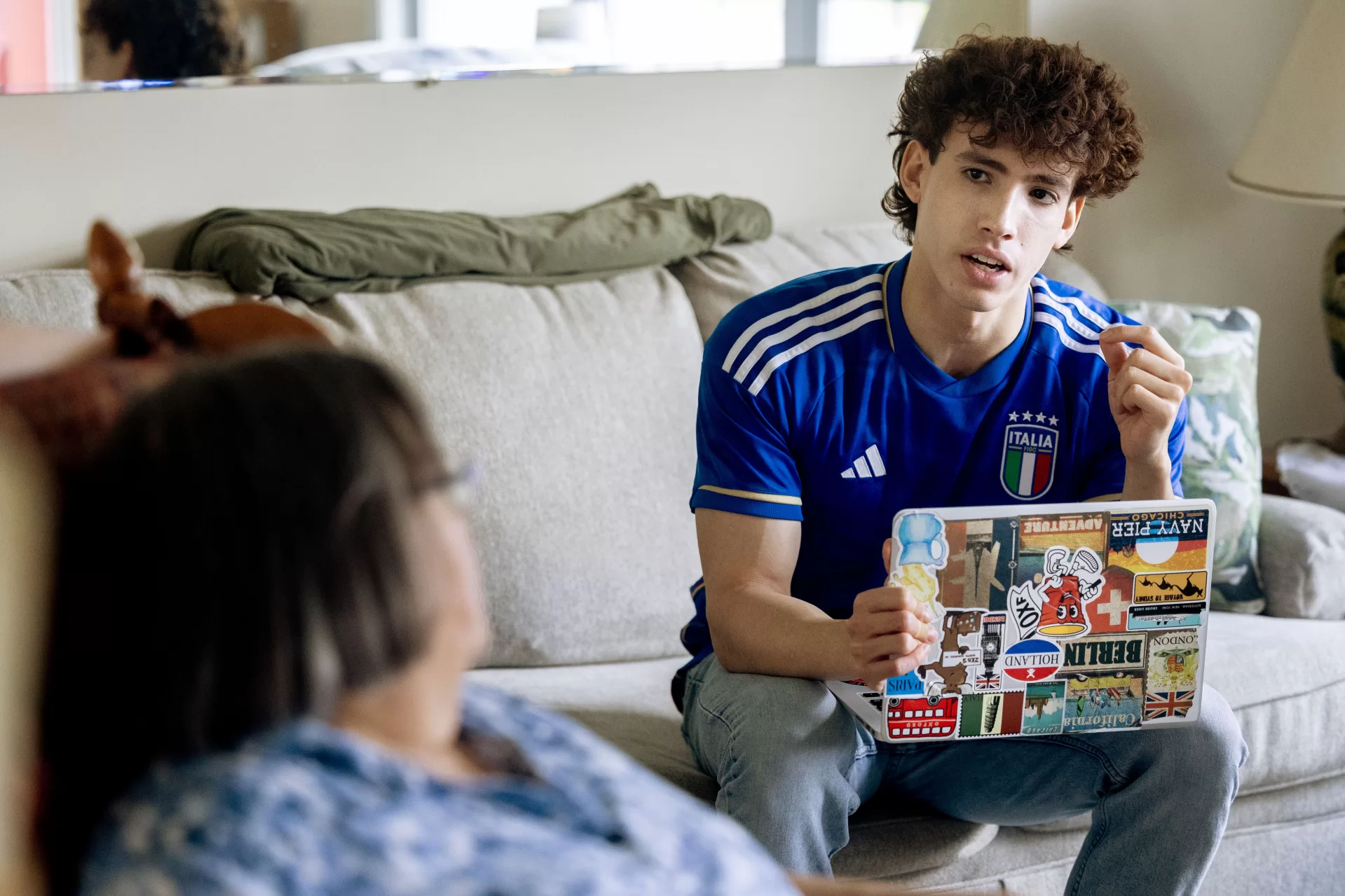
In 2013, Gonzalez left Admission and took a job as a college counselor at a charter high school in Chicago. There he made sure he introduced families to the idea that a small liberal arts college, like Bates, could be accessible to topnotch students regardless of their financial status. Because the Carmonas had two siblings in the same class year at the school, this message had particular resonance. After Christopher and Alanis were both accepted to Bates, they came to tell Gonzalez. “Obviously I’m over the moon,” he said.
Christopher was ready to pack his bags for Lewiston, but it wasn’t an automatic yes for Alanis; “I was very very attached to my mom,” she says. “And very scared of leaving.” Gonzalez understood. His visit to Bates at age 17 for the college’s fly-in Prologue program was his first time on an airplane. “We talked a lot about the transition, being away from home,” he said. “And I knew I wanted to connect them to the support network I had there.”
“It was almost like that instant connection — you could tell they wanted grandkids as much as we wanted grandparents.”
Alanis recalls getting an email from Carmen and Richard during her and Christopher’s first couple of weeks on campus. Would they like to come over? Richard could pick them up. “And I was like, OK, we’re putting a lot of trust out there.” But as soon as they met Richard at Commons, any fears disappeared.
“He was just instantly such a funny character,” Alanis said. “He gave me grandpa vibes.” When they walked into the Thibodeau house and met Carmen and the new husky, Nikita, the good vibes continued.
“They didn’t have grandkids at the time, and our grandparents had already passed,” Alanis said. “So I think it was almost like that instant connection — you could tell they wanted grandkids as much as we wanted grandparents.”
Being from the Midwest, the brother-sister duo, born 10 months apart and dubbed the “Chicago twins” by the Thibodeaus, didn’t know much about Maine. “Other than it’s a vacation land and Bates is there, and there’s water, and Portland,” Alanis said, laughing. “So like dutiful grandparents, they really just showed us all around Maine. And soon enough we fell in love with Maine.”
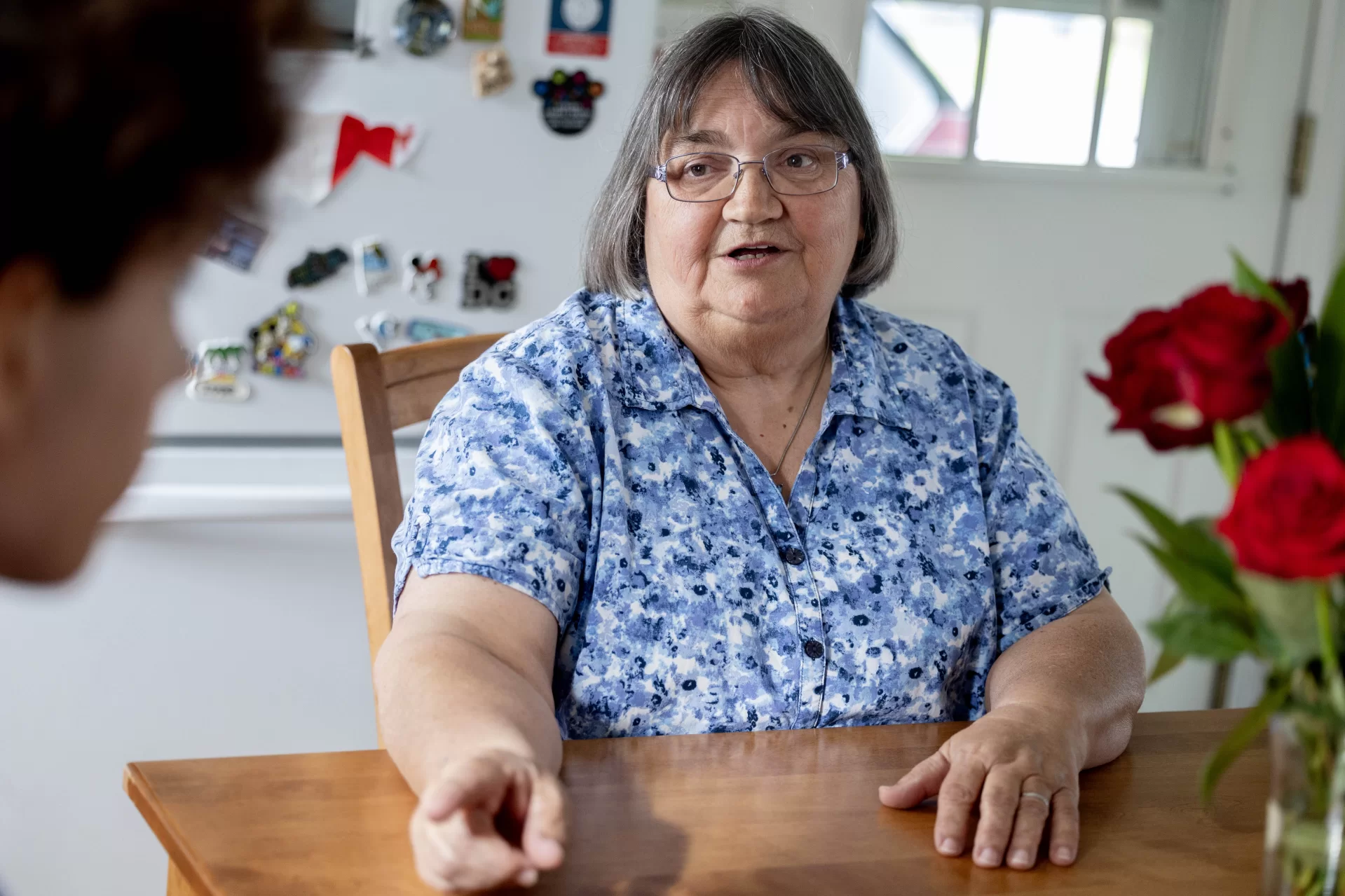
It was on a trip to L.L.Bean, where Carmen first heard Christopher speaking Spanish. His dad, Jose, had called while they were inside the store. “I just wanted to follow Christopher around,” she said. “I loved listening to him speak Spanish. It was just beautiful.”
Christopher majored in economics and Alanis in biochemistry. Both minored in Chinese. “The semesters came and went. But the Thibodeaus were always there,” Alanis remembers. “They kind of just became our family.”
By the time of their Commencement, their younger sister, Carolina, after a flirtation with another NESCAC school, was committed to coming to Bates that fall. But unlike her older siblings, she’d be coming solo. At a party to celebrate graduation, Carmen remembers Rosa Carmona trying to express her gratitude for all that the Thibodeaus had done for Christopher and Alanis, and would do for Carolina. “We were kind of all crying,” Carmen said. “And she was just saying, ‘You don’t know how happy and good I feel to know that you and Richard are here for the kids.’”
During that weekend in 2018, Jose, just 15 at the time, put on his big brother’s graduation gown in a hallway in Chu. He remembers thinking, “I’ll recreate this moment someday, in my own robe.”
In fall 2020, he applied to Bates early decision. He and Carolina, who like Christopher majored in economics, overlapped on campus for one year, when she was a senior. “I would go to her dorm all the time.” She, along with her friend group, helped with his transition to life away from home. So did one of his first professors, Scott Balcomb ’75, then a lecturer in mathematics.
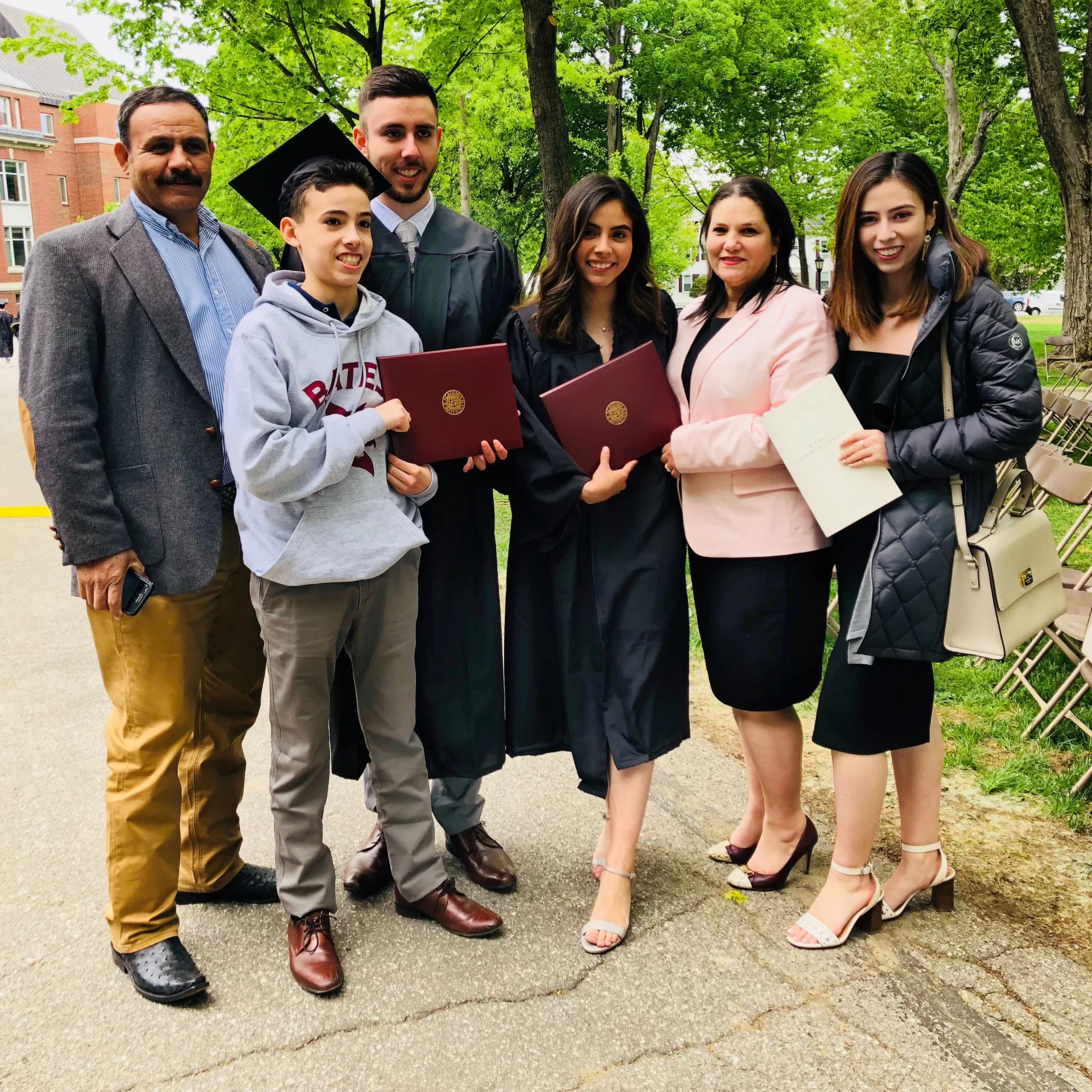
“I would always go to his office hours, even when I didn’t have class with him anymore,” Jose said.
“You can feel the goodness in him,” Balcomb says. “He was just so incredibly open. If I asked him a question or if he asked me a question, he really wanted to know whatever I thought. It was not like he was just being nice to the old man.”
Jose went on to take two more courses with Balcomb, both in calculus, not the easiest subject. This made Balcomb reflect on something essential he had learned himself as a Bates student arriving in 1971. “Bates provided the challenge that if I would work really hard, I could learn far more than I ever thought I could. But to do that, you had to take the challenge. It wasn’t a one-way street. They presented the challenge, and you had to accept it. That’s been my experience with Jose. I presented the challenge to him, and he accepted it and met it. That is just lovely to see. To me, that’s what Bates should be about.”
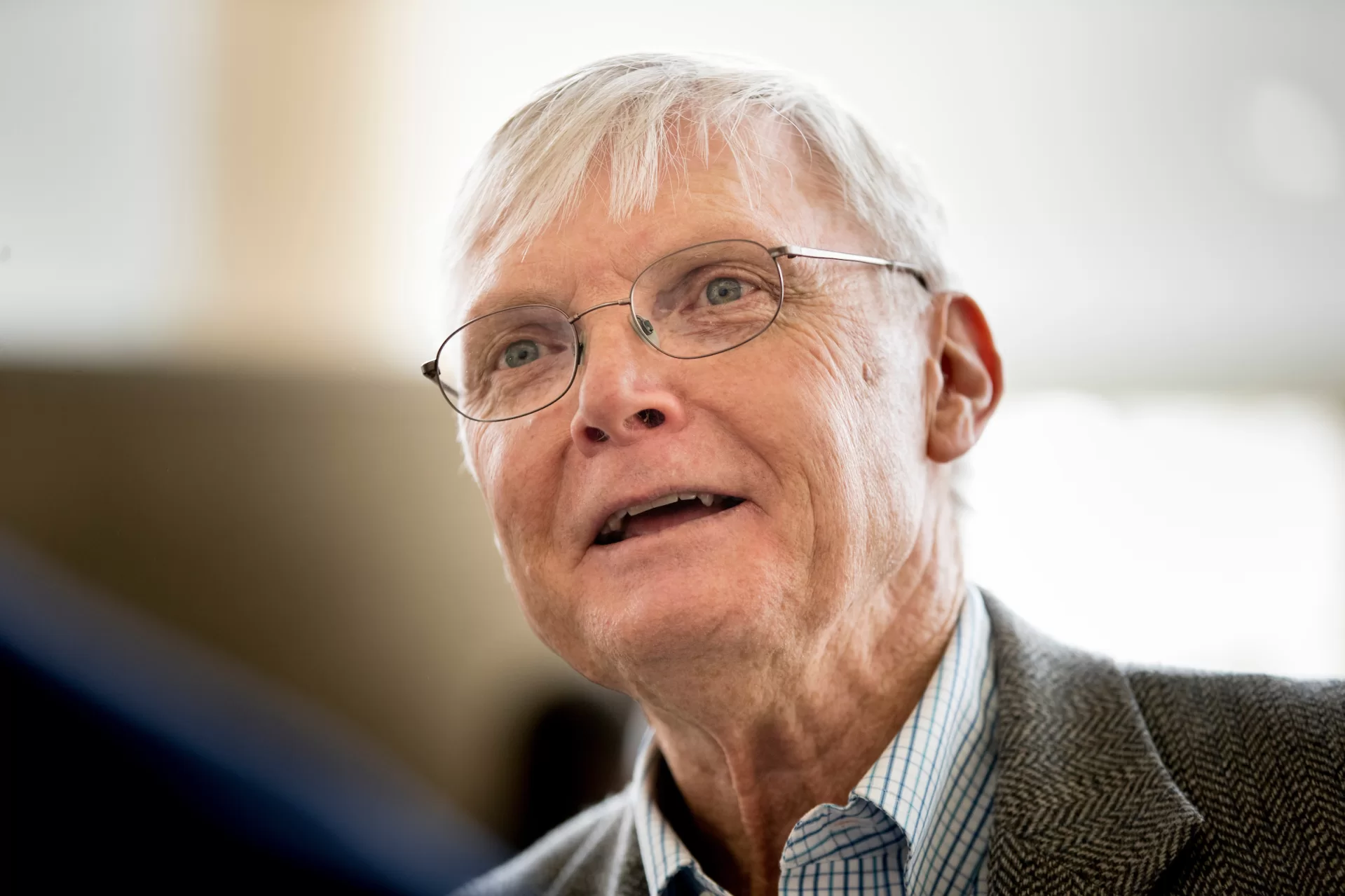
The other day, when Carmen found out how Jose did on his thesis (A+) she texted a few emojis. Exclamation points. Astonished face. Prayer hands and then a big thumbs up. In a few days, he’ll be bound for Chicago and a job as an analyst at J.P. Morgan. If you ask Carmen if she might take on another Bates student as an informal host grandmother, she’ll shake her head. The Carmonas were special.
If you ask Jose, he has another take:
“I think after we go, she’ll probably find another student that needs help, just because she’s so helpful. And I would want that for someone else. I would want someone to have someone they can rely on and go to for advice. Maybe not completely depend on her, just because she is also a very busy lady. But if she does find a student that needs it, I would love that.”
